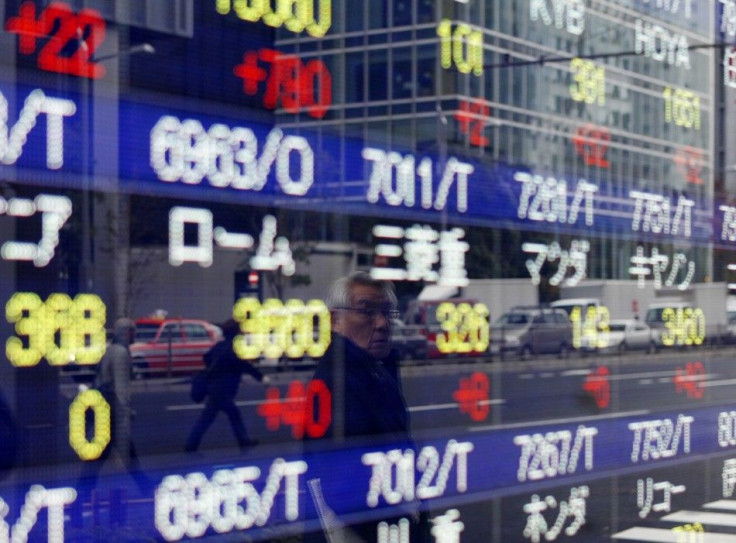Nikkei, Asia Markets Close Slightly Lower Wednesday in Light Trading

(Reuters) - Japan's Nikkei average dropped below a key support level in holiday-thinned trade on Tuesday, on track for a flat performance in December and double-digit losses for the year.
With many overseas investors on year-end holidays, market participants said it had been difficult to buy risk assets though the re-opening of stock trading in the United States later in the day could provide more direction.
If Europe remains calm and no new headlines come out from the region, U.S. markets will be able to positively react up front to the U.S. housing and the consumer confidence data due out later today, said Toshiyuki Kanayama, senior market analyst at Monex Inc.
The Nikkei ended the day 0.5 percent lower at 8,440.56, under its 25-day moving average around 8,461 after managing to break above it on Monday.
The broader Topix eased 0.3 percent to 724.25.
Just 807.2 million shares changed hands on Tokyo's main board, a fresh low for this year and down from Monday's 904.2 million shares.
For the year, the Nikkei is down 17.5 percent and the Topix has lost nearly 20 percent, both underperforming a 0.6 percent rise in the U.S. S&P 500.
Well, it just shows you the decline of market sentiment in Japan. There was the March 11 disaster, the Thai floods.... and more recently the Olympus scandal. It has been quite a year, said Yoshihiro Ito, chief strategist at Okasan Online Securities.
Tokyo Electric Power Co, which has lost some 90 percent of its value since the Fukushima nuclear crisis, finished nearly 1 percent lower after a newspaper reported that the nation's trade and industry minister would urge the company to be effectively nationalised.
It also asked for an additional $8.8 billion from a government body to compensate the victims of the crisis. Both developments had been flagged by media over the past few weeks.
Market players also noted that this year had seen some major declines for heavyweight stocks like Nomura Holdings Inc and Panasonic Corp, both down by around half of their value in 2011.
The fact that major stocks on Japan's market have dropped this much in 2011, and the fact that they haven't bounced back significantly adds to the negative sentiment, Ito said.
Panasonic, a major exporter of consumer electronics, fell 0.6 percent to 641 yen on Tuesday, its lowest closing level this year.
With the European debt crisis unlikely to provide any relief for equities investors, Yasuo Sakuma, portfolio manager at Bayview Asset Management said investors with a long-term view should be sticking with high-yield stocks, such as pharmaceuticals.
Among Nikkei companies, Mizuho Financial Group offers the highest dividend yield at 8.7 percent, followed by Takeda Pharmaceutical at 5.5 percent and insurer NKSJ Holdings at 5.4 percent, Thomson Reuters StarMine data showed.
However, companies that offer the highest 12-month forward dividend cover -- a gauge of their ability to pay the expected dividend out of estimated earnings and cash flow -- were shipper Kawasaki Kisen, telecoms operator Softbank and electronic parts maker Taiyo Yuden Co, according to StarMine.
Meanwhile, most Southeast Asian stock markets fell in lacklustre holiday trade on Tuesday amid easing sentiment in the rest of Asia and some selling in recent gainers like financials and commodities-related shares.
Asian shares eased on Tuesday as investors squared positions in thin volume before U.S. markets reopen after a long weekend and investors see fresh data that could offer clues about prospects for the world's largest economy.
Trading was volatile and rangebound across the region.
Singapore's Straits Times Index edged down 0.1 percent and Jakarta's Composite Index ended 0.2 percent lower. Before a three-day weekend on Friday, Singapore traded around one-week high and Indonesia around a one-month high.
Markets took a breather, with the expected window-dressing activities to boost profiles of institutional investors seen at their peak last week.
The emerging Asian bourses were poised to trade narrowly toward the end of the year, brokers in the region said.
Everyone is in holiday season. I don't think there's going to be heavy window-dressing as it should have peaked since early December, said Jakarta-based investment analyst Lanang Trihardian at broker Syailendra Capital.
Thai SET index extended its losses for a fourth session, easing 0.4 percent to the lowest in more than one week. Vietnam fell for a fourth day, sliding 1.4 percent to the lowest in almost three years.
Philippine shares edged down 0.6 percent at one-week low. Bucking the trend, stocks in Malaysia recouped early losses to end up 0.3 percent at around three-week highs.
Among regional losers, Thai Krung Thai Bank Pcl fell 1.3 percent after Monday's 0.7 percent gain on hopes for strong loan growth. Indonesia's top gas distributor PT Perusahaan Gas Negara Tbk fell 0.8 percent, after last week's 3.2 percent rise.
Among bright spots in the region, budget carrier Tiger Airways climbed 4.1 percent after its CEO made upbeat
comments about its Australian operations and regional ventures.
(Additional reporting by Viparat Jantraprap, Andjarsari Paramaditha in Jakarta and Singapore bureau.)
--
© Copyright Thomson Reuters 2024. All rights reserved.





















